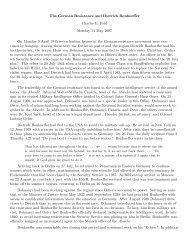Dietrich Bonhoeffer a discussion of the film Bonhoeffer: Agent of ...
Dietrich Bonhoeffer a discussion of the film Bonhoeffer: Agent of ...
Dietrich Bonhoeffer a discussion of the film Bonhoeffer: Agent of ...
Create successful ePaper yourself
Turn your PDF publications into a flip-book with our unique Google optimized e-Paper software.
The decision to return<br />
The <strong>film</strong> opens in New York in 1939 with <strong>Dietrich</strong> standing in <strong>the</strong> midst <strong>of</strong> an African-<br />
American congregation in Harlem, clapping along with <strong>the</strong> congregation as <strong>the</strong>y sing gospel music.<br />
<strong>Dietrich</strong> is accompanied by Frank Fisher, an African-American seminarian at Union Theological<br />
Seminary, through whom he had come to be involved in this congregation. After Frank<br />
and <strong>Dietrich</strong> have been toge<strong>the</strong>r for some time, we learn that <strong>Dietrich</strong> is determined to return to<br />
Germany.<br />
The screenwriters use Frank Fisher and <strong>the</strong> Harlem church to portray this time in <strong>the</strong> USA,<br />
even though all <strong>of</strong> <strong>Bonhoeffer</strong>’s contact with <strong>the</strong>m actually occurred during <strong>the</strong> year that he<br />
spent at Union Seminary in 1930-1931. His experiences in <strong>the</strong> Harlem church did indeed make<br />
a strong impression on <strong>Bonhoeffer</strong>, but he had no contact with <strong>the</strong> congregation or Frank Fisher<br />
in 1939. Such anachronisms are <strong>of</strong>ten used to move a story line along. In this case, however, <strong>the</strong><br />
considerable amount <strong>of</strong> <strong>film</strong> time devoted to <strong>the</strong>se scenes has done nothing to provided a context<br />
for or insight into <strong>Dietrich</strong>’s decision to return.<br />
In June 1939, <strong>Dietrich</strong> <strong>Bonhoeffer</strong> left Germany with plans to spend at least a year in <strong>the</strong><br />
USA. He was, in effect, escaping from Nazi Germany. Just eight days after his arrival in New<br />
York, he surprised everyone (including himself) by abruptly announcing a decision to return to<br />
Germany. This decision was <strong>the</strong> major turning point <strong>of</strong> his life. The <strong>film</strong> never explains why<br />
<strong>Bonhoeffer</strong> returned to Germany. Some <strong>of</strong> his reasons appear in his famous letter explaining his<br />
decision to Reinhold Niebuhr.<br />
. . . I have had time to think and to pray about my situation and that <strong>of</strong> my nation and to<br />
have God’s will for me clarified. I have come to <strong>the</strong> conclusion that I made a mistake in<br />
coming to America. I must live through this difficult period <strong>of</strong> our national history with<br />
<strong>the</strong> Christian people <strong>of</strong> Germany. I will have no right to participate in <strong>the</strong> reconstruction <strong>of</strong><br />
Christian life in Germany after <strong>the</strong> war if I do not share <strong>the</strong> trials <strong>of</strong> this time with my people.<br />
. . . Christians in Germany will face <strong>the</strong> terrible alternative <strong>of</strong> ei<strong>the</strong>r willing <strong>the</strong> defeat <strong>of</strong><br />
<strong>the</strong>ir nation in order that Christian civilisation may survive, or willing <strong>the</strong> victory <strong>of</strong> <strong>the</strong>ir nation<br />
and <strong>the</strong>reby destroying our civilisation. I know which <strong>of</strong> <strong>the</strong>se alternatives I must choose,<br />
but I cannot make that choice in security . . .<br />
These sentences <strong>of</strong>fer a picture <strong>of</strong> <strong>the</strong> thinking behind <strong>the</strong> decision to return, particularly in<br />
<strong>the</strong>ir suggestion <strong>of</strong> his intent to become involved in <strong>the</strong> resistance (“willing <strong>the</strong> defeat <strong>of</strong> <strong>the</strong>ir nation,”<br />
“I know which . . . I must choose”). They do not, however, fully convey <strong>the</strong> nature <strong>of</strong> his<br />
decision. In his diary, on <strong>the</strong> second day after his arrival, he described being “almost overcome<br />
by <strong>the</strong> short prayer” that his hosts <strong>of</strong>fered for <strong>the</strong> German brethren. The following day he described<br />
how he could not “stop thinking <strong>of</strong> Germany,” how he was “dreadfully homesick,” and<br />
how it was “almost unbearable” and “quite intolerable” simply to think about <strong>the</strong> brethren in<br />
Germany. Finally, after making <strong>the</strong> decision to return, he wrote <strong>the</strong> following.<br />
Today, by chance, I read II Tim 4.21 ‘Do your best to come before winter’ – Paul’s request<br />
to Timothy. Timothy is to share <strong>the</strong> sufferings <strong>of</strong> <strong>the</strong> Apostle and not to be ashamed. ‘Do<br />
your best to come before winter’ – o<strong>the</strong>rwise it might be too late. That has been in my ears<br />
all day. We are just like soldiers . . . [away on leave, who return to <strong>the</strong> front] . . . because we<br />
leave our life behind, we destroy it, if we are not back <strong>the</strong>re. There is nothing pious about it,<br />
but something almost vital. But God acts not only through pious emotions, but also through<br />
4



